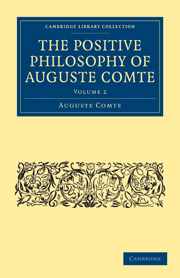Book contents
- Frontmatter
- Contents
- CHAPTER I NECESSITY AND OPPORTUNENESS OF THIS NEW SCIENCE
- CHAPTER II PRINCIPAL PHILOSOPHICAL ATTEMPTS TO CONSTITUTE A SOCIAL SCIENCE
- CHAPTER III CHARACTERISTICS OF THE POSITIVE METHOD IN ITS APPLICATION TO SOCIAL PHENOMENA
- CHAPTER IV RELATION OF SOCIOLOGY TO THE OTHER DEPARTMENTS OF POSITIVE PHILOSOPHY
- CHAPTER V SOCIAL STATICS, OR THEORY OF THE SPONTANEOUS ORDER OF HUMAN SOCIETY
- CHAPTER VI SOCIAL DYNAMICS; OR THEORY OF THE NATURAL PROGRESS OF HUMAN SOCIETY
- CHAPTER VII PREPARATION OF THE HISTORICAL QUESTION.—FIRST THEOLOGICAL PHASE: FETICHISM.—BEGINNING OF THE THEOLOGICAL AND MILITARY SYSTEM
- CHAPTER VIII SECOND PHASE: POLYTHEISM.—DEVELOPMENT OF THE THEOLOGICAL AND MILITARY SYSTEM
- CHAPTER IX AGE OF MONOTHEISM.—MODIFICATION OF THE THEOLOGICAL AND MILITARY SYSTEM
- CHAPTER X METAPHYSICAL STATE, AND CRITICAL PERIOD OF MODERN SOCIETY
- CHAPTER XI RISE OF THE ELEMENTS OF THE POSITIVE STATE.—PREPARATION FOR SOCIAL REORGANIZATION
- CHAPTER XII REVIEW OF THE REVOLUTIONARY CRISIS.—ASCERTAINMENT OF THE FINAL TENDENCY OF MODERN SOCIETY
- CHAPTER XIII FINAL ESTIMATE OF THE POSITIVE METHOD
- CHAPTER XIV ESTIMATE OF THE RESULTS OF POSITIVE DOCTRINE IN ITS PREPARATORY STAGE
- CHAPTER XV ESTIMATE OF THE FINAL ACTION OF THE POSITIVE PHILOSOPHY
CHAPTER IV - RELATION OF SOCIOLOGY TO THE OTHER DEPARTMENTS OF POSITIVE PHILOSOPHY
Published online by Cambridge University Press: 29 August 2010
- Frontmatter
- Contents
- CHAPTER I NECESSITY AND OPPORTUNENESS OF THIS NEW SCIENCE
- CHAPTER II PRINCIPAL PHILOSOPHICAL ATTEMPTS TO CONSTITUTE A SOCIAL SCIENCE
- CHAPTER III CHARACTERISTICS OF THE POSITIVE METHOD IN ITS APPLICATION TO SOCIAL PHENOMENA
- CHAPTER IV RELATION OF SOCIOLOGY TO THE OTHER DEPARTMENTS OF POSITIVE PHILOSOPHY
- CHAPTER V SOCIAL STATICS, OR THEORY OF THE SPONTANEOUS ORDER OF HUMAN SOCIETY
- CHAPTER VI SOCIAL DYNAMICS; OR THEORY OF THE NATURAL PROGRESS OF HUMAN SOCIETY
- CHAPTER VII PREPARATION OF THE HISTORICAL QUESTION.—FIRST THEOLOGICAL PHASE: FETICHISM.—BEGINNING OF THE THEOLOGICAL AND MILITARY SYSTEM
- CHAPTER VIII SECOND PHASE: POLYTHEISM.—DEVELOPMENT OF THE THEOLOGICAL AND MILITARY SYSTEM
- CHAPTER IX AGE OF MONOTHEISM.—MODIFICATION OF THE THEOLOGICAL AND MILITARY SYSTEM
- CHAPTER X METAPHYSICAL STATE, AND CRITICAL PERIOD OF MODERN SOCIETY
- CHAPTER XI RISE OF THE ELEMENTS OF THE POSITIVE STATE.—PREPARATION FOR SOCIAL REORGANIZATION
- CHAPTER XII REVIEW OF THE REVOLUTIONARY CRISIS.—ASCERTAINMENT OF THE FINAL TENDENCY OF MODERN SOCIETY
- CHAPTER XIII FINAL ESTIMATE OF THE POSITIVE METHOD
- CHAPTER XIV ESTIMATE OF THE RESULTS OF POSITIVE DOCTRINE IN ITS PREPARATORY STAGE
- CHAPTER XV ESTIMATE OF THE FINAL ACTION OF THE POSITIVE PHILOSOPHY
Summary
The conditions of the positive philosophy with regard to this science are not fulfilled till its relations with the other sciences are ascertained. Its establishment in its proper place in the hierarchy is a principle of such importance that it may be seen to comprehend all the philosophical requisites for its institution as a science: and it is for want of this that all attempts in our time to treat social questions in a positive manner have failed. Whether we consider the indispensable data of various kinds supplied to sociology by the other sciences, or the yet more important requisite of the sound speculative habits formed by the preparatory study of them, the daily spectacle of abortive attempts to construct a social science leaves no doubt that this grand omission is the cause of the failure, and of the wrong direction always taken, sooner or later, by minds which seemed fitted to accomplish something better. We must, then, review the relation of this last of the sciences to all the rest; but our examination of each of them, and of biology especially, has so anticipated this part of my subject, that I may pass over it very briefly. It is a new idea that the science of society is thus connected with the rest: yet in no case is the relation more unquestionable or more marked. Social phenomena exhibit, in even a higher degree, the complexity, speciality, and personality which distinguish the higher phenomena of the individual life.
- Type
- Chapter
- Information
- The Positive Philosophy of Auguste Comte , pp. 111 - 126Publisher: Cambridge University PressPrint publication year: 2009First published in: 1853



